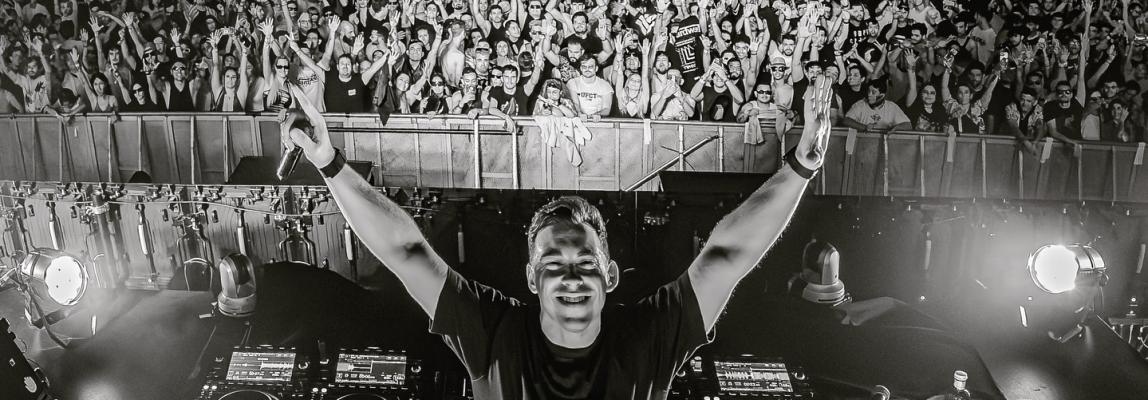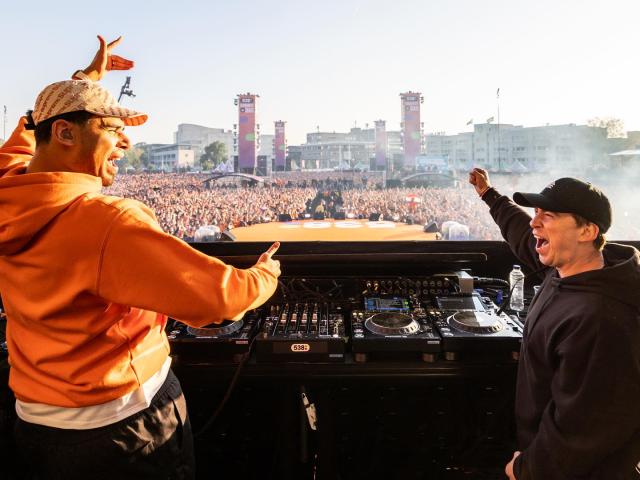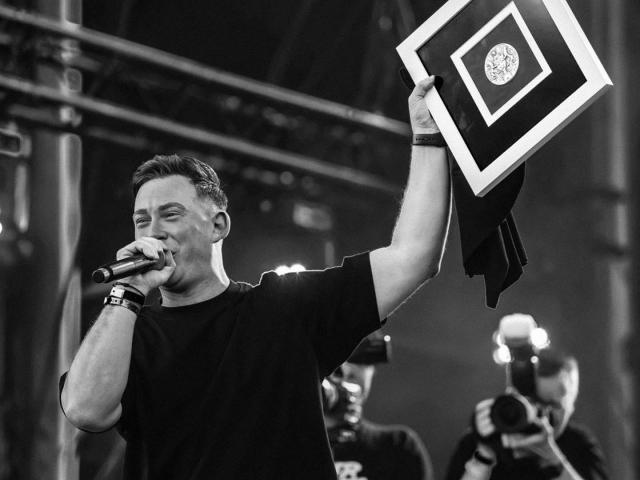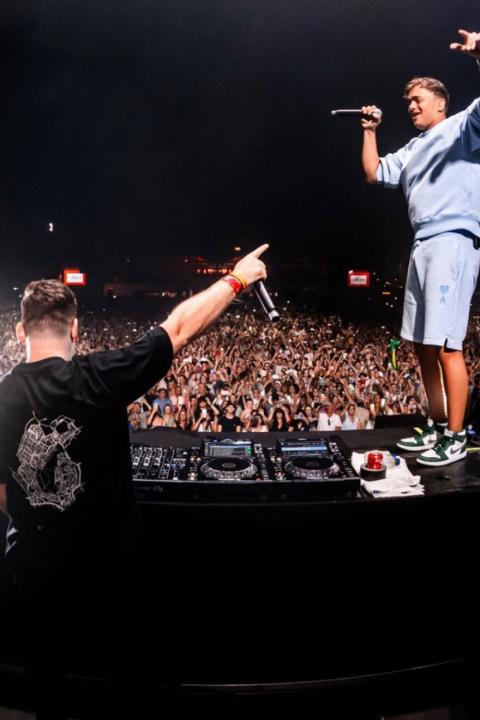
A conversation with Hardwell: on roots, rhythm and reality in the events industry
07/01/2025 - 12:03
- Kennis
- Industry
- Stories
From school party to world stage
Which secondary school did you attend in Breda? Did you already have ambitions to do something with music then?
I completed HAVO at Prisma College - Graaf Engelbrecht. I was already the DJ at our school parties back then, and signed my first record deal at the age of 14.
You were born and raised in Breda. How has the city influenced your creative development? And how have you influenced the city?
Breda is truly my home. The city has played an enormous role in my creative development. I grew up there, experienced my first parties, and also took my first steps in music. The mentality of the people in Breda has shaped me. They are down-to-earth, but with a passion for music and life. What is also special is that Breda has always been a breeding ground for talent. Just look at artists like Tiësto; examples like that have inspired me to dream big, even if you come from a relatively small city.
That I myself have now been able to mean something for the city and the music scene there, feels like an enormous honour. Becoming an honorary citizen of Breda was really one of the most emotional moments in my career. It feels like it has been a mutual exchange: the city has inspired me, and I have hopefully inspired others there to find their own way in music or creativity.
In your opinion, is Breda a good place for young creatives and future event managers?
Absolutely. Breda is a top city for young creatives and future event managers. There is a very open and accessible atmosphere, and there are many initiatives that encourage young talent. Think of event training courses, local festivals and places where young creators can experiment. When I started, there were already small parties and organisations where I could play my first DJ sets. Low-threshold opportunities like that are so important.
Additionally, there is a lot of knowledge and experience in Breda. The city has a rich history in the field of dance and events, so it is easy to get in touch with people from the profession. It is a kind of community where people support each other. That makes it a very fertile place for young people to grow, learn, and eventually break through.
You still live in Breda, why does this city still attract you so much?
Breda just feels like home. No matter how much I have had the opportunity to travel and perform all over the world, it is always Breda where I find peace. The people, the atmosphere, the balance between city and nature... It suits me. It is a place where I can be myself, without the hustle and bustle that sometimes comes with being an artist.
Besides, my friends and family live here, and I find that super important. That grounding, that down-to-earth nature of Brabant, keeps me grounded. Breda has shaped me, and it continues to inspire me. It is a city that is alive, but at the same time also radiates a kind of tranquillity and authenticity that I value highly.

Hardwell and Afrojack at 538 Koningsdag in Breda
Would BUas have been something for Hardwell?
Suppose you did study at BUas, do you think Leisure & Events Management could have offered you something in your career as an artist and entrepreneur?
Yes, I think Leisure & Events Management at BUas could definitely have been valuable. As an artist, you end up seeing that there is much more to it than just making music or performing. You are also an entrepreneur, you run a brand, you think about shows, experiences, marketing, you name it. That education would probably have given me earlier insights into how to build bigger concepts, how to collaborate with teams, and how to professionally handle the business side of entertainment.
In my case, I learned most of that 'on the job', but if I had had that knowledge earlier, it might have made me even more strategic in certain choices. And what I like about BUas is that it is hands-on. So, you do not just learn from books, but you actually gain experience. That fits well with the creative industry.
What happens behind the scenes at major events
As a DJ and producer, you are part of major events yourself. Which aspects of event management do you notice most? What goes well or perhaps less well?
Because I have been part of the scene for so long, I automatically look at shows with a kind of event manager's perspective as well. What always strikes me is how crucial communication and coordination are behind the scenes. When that goes well - from stage management to lighting, sound, artist support - you immediately feel it on stage and in the audience. You really notice when there is a good team behind an event.
What could sometimes be even better is really putting the audience at the centre. Not just in the show itself, but in the whole experience around it: from entrance to departure. Things like waiting times, accessibility, or how information is communicated via apps or social media can make a big difference in how someone experiences an event.
But overall, I see the quality of events improving every year. More and more attention is being paid to storytelling, technology, sustainability, and that is great to see. So, I feel proud to be part of such a professional industry.
Do you yourself have much influence on how an event or festival runs when you perform there?
Yes, especially at the bigger shows, I have quite a lot of influence on that. Especially when it comes to my own sets or shows like 'Revealed' hostings or solo concerts, I am very closely involved in the creative process. Think about the visuals, the construction of the set, the timing of pyro and lighting, how the story of the show is told - it all has to align with my music and vision.
Has much changed at events and festivals during your career? What do you notice?
So much has changed since I started. In the early years, festivals and events were often more raw, small-scale, and focused more on the music itself. That certainly had its charm, but now you see that the whole event has become much more professional and large-scale. Shows are now complete audiovisual experiences, almost like a concert of a rock band or pop star with storytelling, stage design, technical feats, and mega-productions. That has really gone to the next level.
What do you think are the most important skills young people need to develop to be successful in the events industry?
I think young people in the events industry need to be especially flexible and creative. Things change quickly, schedules shift, technical issues crop up; you have to be able to switch gears and come up with solutions under pressure. But at the same time, a professional attitude is super important: being on time, communicating well, knowing how to deal with artists and teams. That balance between creativity and reliability really makes the difference.
Digital skills are also indispensable these days. From social media to lighting and sound engineering, and from ticketing software to production planning, it is often all about smart tools and systems. Understand how these work, and you will be ahead of the game.
Finally, build your network. The event world is small, and revolves around trust. Show that you are willing to work hard and that you are passionate about what you do, and the rest often comes naturally.
Do you notice that social themes such as sustainability and inclusiveness are reflected in the events where you perform?
Yes, I definitely see that, and I welcome that. Sustainability and inclusiveness are becoming increasingly important at the events where I perform. Organisers are much more conscious of their impact. Think about reducing plastic, green electricity at festivals, better waste separation, or, for example, encouraging public transport for visitors. These are steps that really make a difference on a large scale.
You also see inclusivity reflected more and more often, and that is just as important. From a diverse line-up to paying attention to safety, accessibility and creating an atmosphere where everyone feels welcome, that makes events not only fairer, but also stronger as a community.

Hardwell became honorary citizen of Breda
Lessons in leadership: how Hardwell builds his team
What are things you have had to learn 'the hard way' as an entrepreneur?
What I learned 'the hard way' in particular is that success is not only about talent and hard work, but also about patience and building good relationships. In the beginning, I wanted to do everything myself and preferably big right away, but I learned that it is important to gather people around you who you can trust and who have expertise in different areas. You do not have to do everything on your own.
I also became aware of the importance of balance. In the beginning, I was sometimes too much 'on', which came at the expense of my energy and creativity. Now I know that rest and focus are crucial for sustainable growth.
If I could do it all over again, I might have been quicker to trust my team more and invest more in the business side. But on the other hand: those very lessons have shaped me and made me stronger. It is a process, and you grow with every challenge.
How do you choose the right people in your team?
For me, choosing people is mainly about trust and passion. You want people around you who not only do their job well, but who really believe in what we want to achieve together. It is about a match on a personal level, but also about professionalism. I look for people who think proactively, show initiative and are flexible, because in this industry things often change a lot and quickly.
I also find it important that my team members are honest and communicate openly. That creates a strong foundation, especially during tours and shows where you spend many hours together and are under pressure. Everyone has to know where they stand, so we can push hard together and make the most of it. In short: these are people who not only have the skills, but also really want to be part of the story.

Hardwell and Flemming at Breda Live
Balance, rest and staying grounded
How do you combine travelling with relaxation and your social life?
Travelling is part of the business, of course, and I love seeing the world and sharing my music with people everywhere. But it is also intense, because you are on the road a lot, often in different time zones, and that can be quite tough on your energy and rhythm.
That is why I very consciously make sure I keep time for relaxation and my loved ones. Home in Breda is my 'anchor'. There I recharge and can really be myself. I also try to schedule quality time with family and friends whenever possible, even if it is sometimes brief. It is a conscious choice to guard that balance, because without that peace and support, you cannot sustain it in the long run. It also helps to take good care of yourself: eat healthy food, get enough sleep, and exercise when you can. That is how I stay fit and sharp, both on stage and off.
How do you make sure you have a good team around you?
Finding the right people starts with trust and shared goals. I look for professionals who are not only good at their craft, but who also understand where I want to go with my music and brand. Open communication is crucial here; I always want to know what is going on and for everyone to be honest, even when things get tough.
I also look for people who show initiative and can act independently, so that I can focus on my creative work. It also helps enormously if they are flexible and can switch quickly, because the music world moves at lightning speed.
Ultimately, you build a team through experience and by growing together. It is a process, but once you find those right people, you notice that you can achieve much more and the work becomes more fun too.
The photographs used in this article are courtesy of Hardwell's Facebook page.